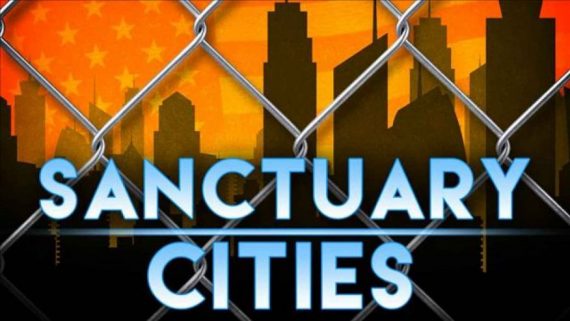Appeals Court Strikes Down Trump Order On ‘Sanctuary Cities’
The Seventh Circuit Court of Appeals has struck down a Trump Administration Order that purported to punish so-called 'sanctuary cities.'

A Federal Appeals Court has struck down a Trump Administration Executive Order seeking to punish cities who decline to aid Federal immigration authorities in rounding up undocumented immigrants:
President Donald Trump’s effort to crack down on sanctuary cities suffered another legal setback Thursday as a federal appeals court in Chicago upheld a nationwide injunction against making federal grant funding contingent on cooperation with immigration enforcement.
A three-judge panel—all of whom are Republican appointees—ruled that there were strong indications that the administration ex
One judge on the 7th Circuit Court of Appeals panel, Daniel Manion, said he would narrow the injunction to protect only Chicago.
“The nationwide injunction is simply unnecessary here,” Manion wrote. “Other jurisdictions that do not want to comply with the Notice and Access conditions were not parties to this suit, and there is no need to protect them in order to protect Chicago. An injunction, particularly a preliminary injunction, is an extreme remedy. A nationwide preliminary injunction is more extreme still. One should only be issued where it is absolutely necessary, and it is far from absolutely necessary here.”
eeded its legal authority in trying to implement the new conditions without approval from Congress.
The ruling came on a suit filed by the City of Chicago after the Justice Department imposed the new conditions last July in a bid to encourage state and local governments to provide more assistance to immigration authorities.
In a strongly worded opinion, Judge Ilana Rovner said allowing federal agencies to add conditions to grant funds without explicit congressional authority could lead toward “tyranny.”
“The Attorney General in this case used the sword of federal funding to conscript state and local authorities to aid in federal civil immigration enforcement. But the power of the purse rests with Congress, which authorized the federal funds at issue and did not impose any immigration enforcement conditions on the receipt of such funds,” Rovner wrote, in an opinion joined by Judge William Bauer. “It falls to us, the judiciary, as the remaining branch of the government, to act as a check on such usurpation of power.”
However, the nationwide injunction freezing the Justice Department’s effort will remain in place since Rovner and Bauer ruled that Chicago-based U.S. District Court Judge Harry Leinenweber’s order that it apply across the country appeared to be justified.
More from the Chicago Sun-Times:
Declaring the United States a country that “jealously guards the separation of powers,” a federal appeals court in Chicago on Thursday dealt the Trump Administration a new blow in its ongoing feud with sanctuary cities.
The 7th U.S. Circuit Court of Appeals upheld in a 35-page opinion a nationwide injunction stopping Attorney General Jeff Sessions from applying new conditions to grant money to force cities to cooperate with immigration authorities.
Appellate Judge Ilana Rovner made clear in the opinion the court’s role was “not to assess the optimal immigration policies for our country.” However, she wrote that “the issue before us strikes at one of the bedrock principles of our nation” — the separation of powers.
“The Attorney General in this case used the sword of federal funding to conscript state and local authorities to aid in federal civil immigration enforcement,” Rovner wrote. “But the power of the purse rests with Congress, which authorized the federal funds at issue and did not impose any immigration enforcement condition on the receipt of such funds.”
There was no immediate comment from City Hall. Justice Department spokesman Devin O’Malley said in a statement that the DOJ “believes it exercised its authority.”
“Many in the legal community have expressed concern that the use of nationwide injunctions is inconsistent with the separation of powers, and that their increased use creates a dangerous precedent,” O’Malley said. “We will continue to fight to carry out the Department’s commitment to the rule of law, protecting public safety, and keeping criminal aliens off the streets to further perpetrate crimes.”
The grant at issue is the Edward Byrne Memorial Justice Assistance Grant, used by local governments for law enforcement needs like police cruisers, body cameras and community programs aimed at reducing violence.
The appellate court upheld the nationwide scope of the injunction first ordered in September by U.S. District Judge Harry Leinenweber in Chicago. Appellate Judge Daniel Manion wrote a 14-page opinion mostly agreeing with his colleagues but insisting Leinenweber went too far when he applied his ruling across the country.
“We are not the Supreme Court, and we should not presume to decide legal issues for the whole country,” Manion wrote.
Chicago sued Sessions in August over the new conditions tied to the Byrne grant. One of them would require the city to give the feds, when requested, a 48-hour heads up of the scheduled release date and time “of an alien in the jurisdiction’s custody.” Another requires federal access to “any correctional or detention facility in order to meet with an alien … and inquire as to his or her right to be or remain in the United States.”
This ruling is just the latest legal setback that the Trump Administration’s efforts to penalize American cities and other jurisdictions who decline to turn suspects or others who may have been detained over the Federal immigration authorities. The first such ruling came in April of last year when a Federal District Court Judge in San Francisco issued a nationwide temporary injunction against the enforcement of one of those efforts. The Judge in that case, William Orrick, found that the policy violated both principles of Federalism set forth in the Tenth Amendment and the Separation Of Powers in that it involved the Executive Branch presuming to assume for itself questions regarding the availability of Federal funding for cities based on criteria not within its discretion under the relevant Federal law. That ruling was later converted into a permanent injunction by the same Judge in an opinion released back in November that relied on much the same grounds as the original order. Prior to that ruling, a Federal District Court Judge in Illinois, ruling on a case that had been filed by the City of Chicago, issued another nationwide injunction against another Department of Justice effort to punish so-called “sanctuary cities.” That ruling, by Judge Harry Leinenweber, a Reagan appointee who has been on the bench since 1985, found that the policies at issue were also unconstitutional due to the fact that they violated both the Tenth Amendment and the powers granted to the Federal Government by the Constitution. It is this ruling that the Seventh Circuit largely upheld in its ruling yesterday.
I’ve outlined the basic elements of the case against these efforts by the Trump Administration rest upon some rather easy to understand principles and a trio of Supreme Court decisions that stand for the proposition that the Federal Government cannot compel the states to enforce Federal laws except perhaps in very limited circumstances.
The line of relevant cases begins with South Dakota v. Dole, a case in which South Dakota and other states challenged a Federal law that withheld a portion of Federal highway funds from states that declined to raise their drinking age to 21. The states argued that the statute was invalid because it interfered with powers reserved for the states by the Tenth Amendment. The Court ruled in favor of the Federal Government but also set forth a series of criteria that the Federal Government must meet in order to avoid violating the Tenth Amendment and other protections of the rights and powers of the states when using this method to force action by the states.
Some five years after Dole was decided, the Court handed down its decision in New York v. United States. That case dealt with a Federal law governing the disposal of low levels of radioactive waste. One of the provisions of that law required states to “take title” to such waste and made them primarily responsible for its disposal. The Court found that provision of the law to be unconstitutional because it attempted to compel the states to participate in a federal regulatory program, which Justice O’Connor ruled “crossed the line distinguishing encouragement from coercion.” Specifically, O’Connor found that the “take title” provision was impermissible because it forced to choose between complying with Federal regulations and taking title to the waste. Given that Congress lacked the authority to compel the states to do either of these things, it similarly lacked the authority to compel them to choose between them due to the “core of state sovereignty” recognized by the Tenth Amendment.
Finally, some five years after New York and ten years after Dole, the Court handed down a ruling in Printz v. United States that has stood for twenty years as the definitive ruling on the extent to which Federal law can be used to compel states to act. Printz dealt with provisions of the Brady Handgun Violence Prevention Act, the so-called “Brady Bill.” One part of that bill required state and local law enforcement to conduct background checks for all gun purchases within their borders for an interim period until a Federal database that would conduct those checks on a more-or-less instant basis could be built, tested, and put into operation. The Supreme Court struck that provision down as unconstitutional under the Tenth Amendment in a decision written by Justice Scalia that relied heavily on both the criteria set forth in Dole which the Federal Government must meet to compel states to act and the holding in New York that more fully developed the limits on the Federal Government’s ability to force the states to act.
There is, of course, one other decision relevant to this issue, and it is of relatively recent vintage. That case is National Federation of Independent Business v. Sebelius, the 2011 case in which the Supreme Court largely upheld the Constitutional arguments against the Affordable Care Act. In one part of that decision, though, the Court struck down one provision of the PPACA that purported to use Federal power to force the states to expand Medicaid by threatening to withhold all of a state’s Medicaid funding if it declined to expand coverage as permitted under the PPACA. While there was not a solid majority supporting the reasoning for a decision in that part of the case, there was a majority in agreement with the result that the requirement that states expand the program or risk losing hundreds of millions of dollars or more in Medicaid funding was not permissible under either Article I or the Tenth Amendment.
The Federal Government has two options going forward. The most obvious, and thereby the most likely, would be to appeal this ruling to the Supreme Court. Assuming the Court accepted the case for review, which is not guaranteed but is potentially likely given the fact that it involves a nationwide injunction, it would be argued in the term that begins in October, meaning that we might not get a decision in the case until some point in 2019. Alternatively, they could seek a review by the entire Seventh Circuit Court of Appeals. As I’ve noted before, though, that kind of en banc review is entirely discretionary and seldom granted. In the meantime, the San Francisco case remains pending and both that injunction and the one upheld by the Seventh Circuit ruling issued yesterday remain in effect.
Here’s the Court’s opinion:
Chicago v. Sessions Et Al by Doug Mataconis on Scribd
;





It’s this kind of patented, trademarked Trump “so much winning” that has the GOP obstructing the Mueller investigation.